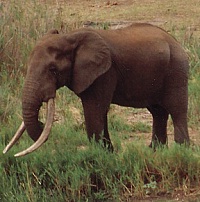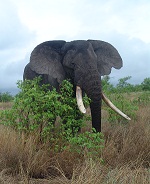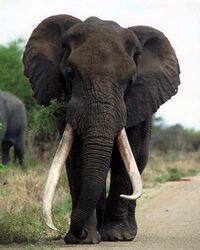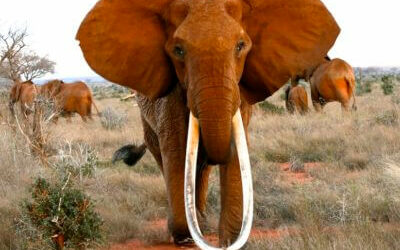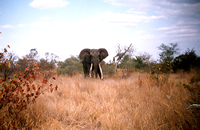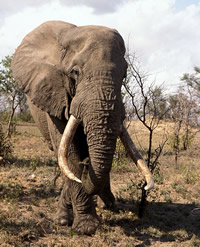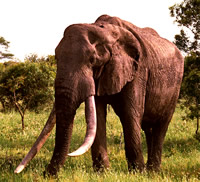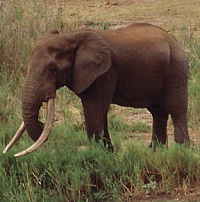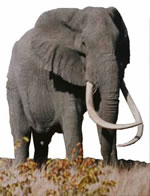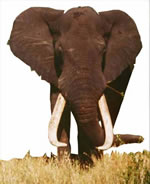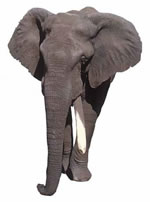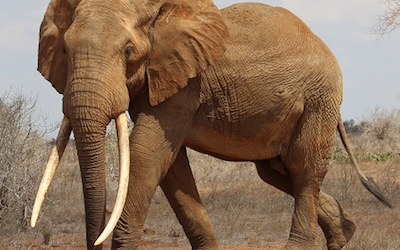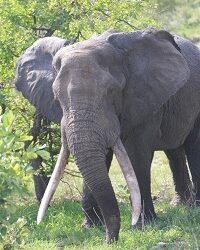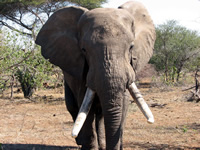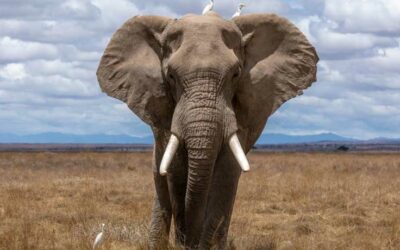How do our tents get their names?
You have may noticed by now that many of our tents have very unique names. Like the Kambaku, Mambrrr, Phelwane and so on. Those names pay tribute to the legendary and magnificent elephants of Africa, past and present. The founder of Exclusive Tents Paul Zway worked as a game ranger in Kruger National Park for 17 years. Paul worked closely with some of these elephants with some of them frequenting the sections he worked on.
Even though some of our tent names may be difficult to pronounce, they are all named for these legendary smart animals.
Before we got around to naming our tents giving tribute to these beautiful beasts, we initially named the tents mainly after African landscapes, trees and birds but recently some other tent companies have copied and are using these tent names to divert sales and internet searches to their websites, which is causing a lot of confusion in the market.
Even though copying is possibly the best form of flattery, we have decided to change all these names and attributing them to more elephant names which will coincide with the launch of our New Website.
We feel that our tents greatly relate to elephants in their strength, size, longevity, beauty and grandeur. As elephants are majestic in their environment so are our tents.
The elephant has no natural enemies (except for man) even though the males tend to fight from time to time, our tents only find a harmony in their natural environment.
Some of the new tent names are from Southern and East African elephants, male and female alike.
Photo credit above to: Rex/Shutterstock
Spirowiri
Spirowiri Origin of Name: This tusker was named by Dr Ian Whyte for the Spirowiri waterhole in the Shingwedzi River. (Spirowiri is the Tsonga word meaning ‘two difficult tasks’)Range: Shingwedzi area in far northern Kruger National ParkSpecial Features: Well matched...
Babalala
Babalala Photo by Dewald Keet Origin of Name: Named for the Borehole 5km south-east of Vlakteplaas on the banks of the Dungile Spruit and was the name of a former inhabitant of the area.Range: Vlakteplaas, Babalala Waterhole.Special Features: Prominent v-shaped tear...
Mabarule
Mabarule Photo by Johan Marais Origin of Name: During 1999 the Field Rangers and Conservation Students at Mooiplaas started referring to this elephant as “Mabarule” after their Section Ranger Johann Oelofse’s Tsonga nickname. Johann was so named by his fellow workers...
Xilowa
Xilowa (Shilowa) Photo by Keith Begg Origin of Name: Pronounced and commonly spelt Shilowa this bull was named by Dr Ian Whyte after the Shilowa koppie situated near the Mozambique boarder, where it was known that a strange man used to live. (Shilowa is the Tsonga...
Dida
DidaEstimated Age: 45 to 50 years oldStatus: AliveHerd: Matriarch of a herd formerly of 15 elephants, now 7 members. Has a sub-adult calf.Special Features: Has clean ears with no notches or tears. Has a full patch of tail hair on the inner side of the tip of her tail...
Bachuma
BachumaEstimated age: 40 plus years Special features: Very thick IvoryScar on left abdomenShorter right TuskNo cuts on his EarsTriangle like Tusks Home Range: sighted mostly in the Emusaya area, TENP. Temperament: He has been approached on the ground a few times, but...
Mahlati
MahlatiOrigin of Name: Named after the Mahlati Stream, a tributary of the Ntshivana, situated in the north of the Kruger National Park. Mahlati was also the name of a chief who lived close to the stream.Range: South East of Shingwedzi Camp.General: This bull was first...
Mambrrr
MambrrrOrigin of Name: This bull was named by Dr Ian Whyte in memory of “Mambrrr” - Philemon Chauke who was a Research Assistant for many years in the Kruger National Park based in Skukuza. (The origin of his name is obscure, but it is believed to come from a locally...
Phelwane
PhelwaneOrigin of Name: Phelwana was named by Anthony Hall-Martin when he was seen emerging from the Phelwana stream and tributary of the Timbavati in the central region of the Kruger National Park. (Origin of the name is unknown but was possibly a person of long ago...
Spirowiri
SpirowiriOrigin of Name: This tusker was named by Dr Ian Whyte for the Spirowiri waterhole in the Shingwedzi River. (Spirowiri is the Tsonga word meaning ‘two difficult tasks’)Range: Shingwedzi area in far northern Kruger National ParkSpecial Features: Well matched...
Shawu
ShawuOrigin of Name: The “Shawu Bull” was named after the Shawu valley (Vlei) in which he spent much of his life.Range: Shawu moved over a large range which spanned the flat Mopani covered plains country between the Letaba and Shingwedzi rivers and stretched from the...
Dzombo
DzomboOrigin of Name: Named after the Dzombo stream that traverses the Mopani Flats between the Shingwedzi and Shawu valleys. (The word Dzombo is derived from the Tsonga word Dzombolo meaning ‘to wait for something that is slow in coming’)Range: He lived in the area...
Joao
JoaoOrigin of Name: Named by Anthony-Hall Martin for Prester John, legendary priest-king of ancient Africa. (João being the Portuguese for ‘John’) João was also to be found near the waterhole of this name along the Shingwedzi River. This waterhole was named in 1961 by...
Voi
VoiEstimated Age: 35 plus yearsStatus: Alive Special features: Long but thin symmetrical ivory that thins out towards the end Left tusk slightly longer than the right. Distinctive scar on left flank close to the hind leg. Home range: Core range area include Satao,...
Matlakusa
MatlakusaOrigin of Name: ‘Matlakusa’ from tlakusa, is Tsonga meaning to ‘raise, lift up’, this is a large open pan and bore-hole, alongside the eastern border, southeast of Malonga in the Kruger National Park and links to this bull’s large home range.Range: Northern...
Tsotsi
TsotsiOrigin of Name: Named in memory of Ampie ‘Tsotsi’ Espag, who spent many years in the service of the Kruger National Park as both a ranger and hospitality manager. (Tsotsi, meaning sneaky, trouble maker, skelm)Range: Letaba Rest CampSpecial Features: Tsosti has...
Bububu
This beautiful elephant was named after the Bububu Spruit and windmill, where he was regularly seen (Bububu meaning ‘the rumbling of flood waters’). Bububu had a long and straight right servant tusk and a broken shorter left master tusk.
Kambaku
Kambaku is the Tsonga word for and old bull elephant, a token of great respect for the majestic animal. Like the rest of the Magnificent Seven, Kambaku was always a loner.

